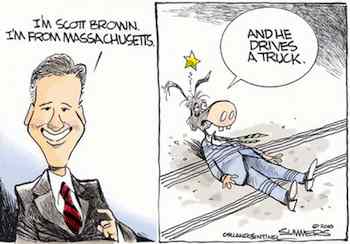- MENU
- HOME
- SEARCH
- WORLD
- MAIN
- AFRICA
- ASIA
- BALKANS
- EUROPE
- LATIN AMERICA
- MIDDLE EAST
- United Kingdom
- United States
- Argentina
- Australia
- Austria
- Benelux
- Brazil
- Canada
- China
- France
- Germany
- Greece
- Hungary
- India
- Indonesia
- Ireland
- Israel
- Italy
- Japan
- Korea
- Mexico
- New Zealand
- Pakistan
- Philippines
- Poland
- Russia
- South Africa
- Spain
- Taiwan
- Turkey
- USA
- BUSINESS
- WEALTH
- STOCKS
- TECH
- HEALTH
- LIFESTYLE
- ENTERTAINMENT
- SPORTS
- RSS
- iHaveNet.com: Politics
by Kent Garber

Senator Scott Brown (© Dana Summers)
After Scott Brown's election to the United States Senate, progressives and healthcare reform advocates are understandably discouraged. But they say the last thing Democrats should do right now is back down on healthcare.
"To interpret this as a national referendum on healthcare would be a mistake," says Richard Kirsch, national director of Health Care for America Now, the largest reform advocacy group. "What the
There is clearly tension among Democrats about how to move forward following the loss of the late Sen. Ted Kennedy's seat to Republican Scott Brown. Some have suggested slowing down and re-evaluating; others, noting how much progress has been made toward a bill, have said just the opposite.
With Brown's victory, the Democrats now hold only 59 seats in the
But reform advocates say the true fate of healthcare lies elsewhere. "There are ways they can pass the reform bill," says Kirsch. "They can get this done. It's really a question of political will. It's not a question of technical" feasibility.
Summoning that consensus, however, will depend on Democrats believing that Americans will warm to reform once
In his acceptance speech, Brown invoked the skepticism, saying, "What I've heard ... on the campaign trail is that our political leaders have grown aloof from the people, impatient with dissent, and comfortable in the backroom, making deals." In that vein he promised "to reform healthcare in an open and honest way" and to "start fresh."
But reform advocates say the malaise is precisely why Democrats need to pass legislation, not push it aside. "People are cynical about government," says Kirsch, "and failing to pass healthcare reform would just increase their cynicism."
In a way, this debate boils down to a question of interpretation: Are voters upset because Washington is trying to do too much or because it hasn't yet done enough? Republicans say the former; Kirsch says it's the latter.
"The independent voters in the middle want change, and change isn't happening fast enough," he says. "Democrats have to understand they have to produce if they are going to get re-elected."
Like Kirsch, Democrats who are championing reform hope that once it passes, people will see the immediate benefits and have a change of heart, as happened with the controversial prescription drug bill several years ago. Once the current bill passes, for example, seniors will quickly get more help to buy drugs, and insurers won't be able to deny coverage to children with pre-existing conditions.
Figuring out how to play up these benefits will most likely become a major prong of the Democrats' strategy in the next few days.
AMERICAN POLITICS
WORLD | AFRICA | ASIA | EUROPE | LATIN AMERICA | MIDDLE EAST | UNITED STATES | ECONOMICS | EDUCATION | ENVIRONMENT | FOREIGN POLICY | POLITICS
Receive our political analysis by email by subscribing here
Scott Brown Victory Not a Referendum on Healthcare | Kent Garber
© Tribune Media Services